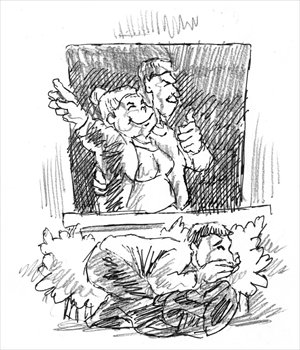Time to reassess praise for first-tier cities

For years, my grandfather has mistaken me for my mother. As an 84-year-old who has suffered mild cerebral thrombosis, he seems unable to comprehend how quickly I've grown up.
I moved to Shanghai years ago for school, and since then I have returned only once or twice a year and stayed no more than a week. He also has trouble telling my cousins, who also moved away, apart.
During this year's Spring Festival, my whole family got together to celebrate the lunar New Year. We each spent time with my grandfather, updating him on our lives one by one until he could finally recognize us again.
We spent a lot of time doing this, despite the fact that we know he'll have forgotten by the next Spring Festival, the only time of year we all get to spend time with him.
About a third of my family members, especially the younger ones, work in other cities. While we don't earn much more than those who stayed in our hometown to work, we are still the ones our family is proud of just because we are working outside in relatively developed cities.
Traditional Chinese people have what can be called a "hometown complex."
People living in new places carry keepsakes from home around with them, and feel they are destined to return to their hometown like fallen leaves are destined to return to the root.
In the past, most people did not choose to leave home but were forced to by weather, famine, or war. Today, however, setting out for greener pastures is a common phenomenon.
Children of the countryside want to go to cities, and graduates from second and third-tier cities want to work in Beijing, Shanghai or Guangzhou. And parents are proud if their children work "outside" rather than "be stuck" in their hometowns.
While China's transportation has developed rapidly in recent years - the high-speed rail system now covers 8,358 kilometers - it cannot accommodate the increasing flow of relocated young workers. Transportation still faces huge pressures every Spring Festival holiday.
Are the jobs in more advanced cities better than anywhere else? Perhaps not. According to Beijing Business Today, a man from Hunan Province who works in Beijing said he can earn 3,000 yuan ($481.40) a month, but spends half of that on rent.
A survey by 51job.com, a recruitment website in China, found that only 4 percent of people who left their hometown for work are earning the salary they'd hoped for, plus they have higher living expenses. Many of these people are not happy in these big cities, but they dare not go back home because their family is proud of them.
The reform and opening-up focused on developing certain areas first, then spreading prosperity throughout the country.
As China's uneven development gets addressed, there are many new opportunities available in small cities and rural areas. While some are hoping to escape first-tier cities due to high housing prices and cost of living, most are still struggling with the "big city" halo.
Migration is restructuring Chinese society and reshaping social concept about "home." Working in China's top cities is certainly an attractive option for many, but perhaps not the best choice for everyone.
The author is a reporter with the Global Times. shumeng@globaltimes.com.cn